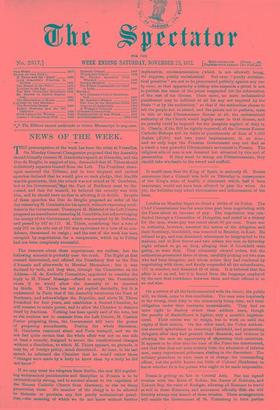On a review of all the facts connected with the
emeute, the public will, we think, come to this conclusion. The men were hopelessly in the wrong, their duty to the community being clear, and their obligation under their contracts unmistakable. They had no more right to disobey orders than soldiers have, though the penalty of disobedience is lighter, only a month's imprison- ment. Their course was to resign, but to work on until the expiry of their notices. On the other hand, the Police authori- ties showed spitefulness in removing Goodchild, and prosecuting delegates after they had granted their demands, and violence in allowing the men no opportunity of expressing their contrition. It appears to be clear that the tone of the Force has deteriorated, and that this does not arise entirely from the admission of inferior men, many experienced policemen sharing in the discontent. The military precedent in such cases is to change the commanding officer, but the public knows too little of Colonel Henderson to know whether he is the person who ought to be made responsible.


































